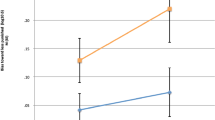Abstract
To test the hypothesis that impulsive problem-solving behavior may be due to a child's low concern about response accuracy on the Matching Familiar Figures Test, a procedure was devised which involved punishment of incorrect responses by withdrawal of tokens given before each trial. This Response-cost procedure and the Standard procedure were given in counterbalanced sequence to two groups of 15 children with a mean chronological age of 13.9 and a mean IQ of 71 who were attending special classes because of academic difficulty. Subjects showed significantly longer latency to first response under the Response-cost procedure and also made significantly fewer errors under this procedure when it was the second one administered. When the Response-cost procedure was given first, the subjects tended to carry over their relatively low error rates to the subsequent trials under the standard procedure.
Similar content being viewed by others
References
Aybe, H. I. The effect of reflective and impulsive training on conceptual tempo. Unpublished doctoral dissertation, Indiana University, 1969.
Briggs, C. Training and generalization of reflective and impulsive styles in school-age children. Unpublished doctoral dissertation, University of Minnesota, 1966.
Butter, E. J. Visual and haptic training and cross-modal transfer of a reflective strategy. Unpublished doctoral dissertation, University of Massachusetts, 1971.
Debus, R. L. Effects of brief observation of model behavior on conceptual tempo of impulsive children.Developmental Psychology, 1970,2, 22–32.
Duckworth, S. The effects of selected visual discrimination intervention conditions on young, impulsive retardates. Unpublished doctoral dissertation, University of North Carolina, 1972.
Gozali, J. Impulsivity-reflectivity as problem-solving styles among educable mentally retarded children.American Journal of Mental Deficiency, 1969,73, 864–867.
Kagan, J. Individual differences in the resolution of response uncertainty.Journal of Personality and Social Psychology, 1965,2, 154–160.
Kagan, J. Impulsive and reflective children. In J. D. Krumbloltz (Ed.),Learning and the educational process. Chicago: Rand-McNally, 1965, 133–161.
Kagan, J., & Kogan, N. Individual variation in cognitive processes. In P. H. Mussen (Ed.),Carmichael's manual of child psychology. Vol. 1. New York: Wiley, 1970.
Kagan, J., Pearson, L., & Welch, L. Conceptual impulsivity and inductive reasoning.Child Development, 1966,37, 583–594.
Kagan, J., Pearson, L., & Welch, L. The modifiability of an impulsive tempo.Journal of Educational Psychology, 1966,57, 359–365.
Kagan, J., Rosman, B. L., Day, D., Albert, J., & Philips, W. Information processing in the child: Significance of analytic and reflective attitudes.Psychological Monographs, 1964,78, (1, Whole No. 578).
Katz, J. M. Reflection-impulsivity and color-form sorting.Child Development, 1971,42, 745–754.
Lindquist, E. F.Design and analysis of experiments in psychology. Boston: Houghton-Mifflin, 1953.
Massari, D. J., & Schack, M. L. Discrimination learning by reflective and impulsive children as a function of reinforcement schedule.Developmental Psychology, 1972,6(1), 183.
Messer, S. Reflection-impulsivity: Stability and school failure.Journal of Educational Psychology, 1970,61(6), 487–490.
Messer, S. The effect of anxiety over intellectual performance on reflection-impulsivity in children.Child Development, 1970,41, 723–735.
Meichenbaum, D., & Goodman, J. Reflection-impulsivity and verbal control of motor behavior.Child Development, 1969,40, 785–797.
Nelson, T. F. The effects of training in attention deployment on observing behavior in reflective and impulsive children. Unpublished doctoral dissertation, University of Minnesota, 1968.
Odom, R. D., McIntyre, C. W., & Neale, G. S. The influence of cognitive style on perceptual learning.Child Development, 1971,42, 883–891.
Reali, N., & Hall, V. Effect of success and failure on the reflective and impulsive child.Developmental Psychology, 1970,3, 392–402.
Ridberg, E. H., Parke, R. D., & Hetherington, E. M. Modification of impulsive and reflective cognitive styles through observation of film-mediated models.Developmental Psychology, 1971,5(3), 369–377.
Roettger, D. M. D. The effects of directed and nondirected training upon the visual discrimination performance of reflective and impulsive children. Unpublished doctoral dissertation, University of Iowa, 1971.
Slosson, R. L.Slosson Intelligence Test (SIT) for children and adults. East Aurora, N.Y.: Slosson Educational Publications, 1963.
Ward, W. C. Reflection-impulsivity in kindergarten children.Child Development, 1968,39, 867–874.
Weinberg, R. A. The effects of different types of reinforcement in training reflective-conceptual tempo. Unpublished doctoral dissertation, University of Minnesota, 1968.
Worker, C. The effect of teacher tempo on the reading progress of reflective and impulsive boys. Unpublished doctoral dissertation, University of Minnesota, 1970.
Wyne, M. D., Coop, R. H., & Brookhouse, D. Information processing in young educable mentally retarded children.American Journal of Mental Deficiency, 1970,75, 371–375.
Yando, R. M., & Kagan, J. The effect of teacher tempo on the child.Child Development, 1968,39, 27–34.
Author information
Authors and Affiliations
Additional information
Appreciation is expressed to Dorothy Arnold, Frank Scott, and the participating pupils from Mary Potter School in Oxford, North Carolina. Funds for computer processing were provided by the Center for Research on Exceptional Children, School of Education, University of North Carolina at Chapel Hill. The project was supported in part by U.S. Public Health Service, Maternal and Child Health Service Project No. 916 and by Grant HD-03110 from the National Institute of Child Health and Human Development.
Rights and permissions
About this article
Cite this article
Errickson, E.A., Wyne, M.D. & Routh, D.K. A Response-cost procedure for reduction of impulsive behavior of academically handicapped children. J Abnorm Child Psychol 1, 350–357 (1973). https://doi.org/10.1007/BF00917633
Issue Date:
DOI: https://doi.org/10.1007/BF00917633




